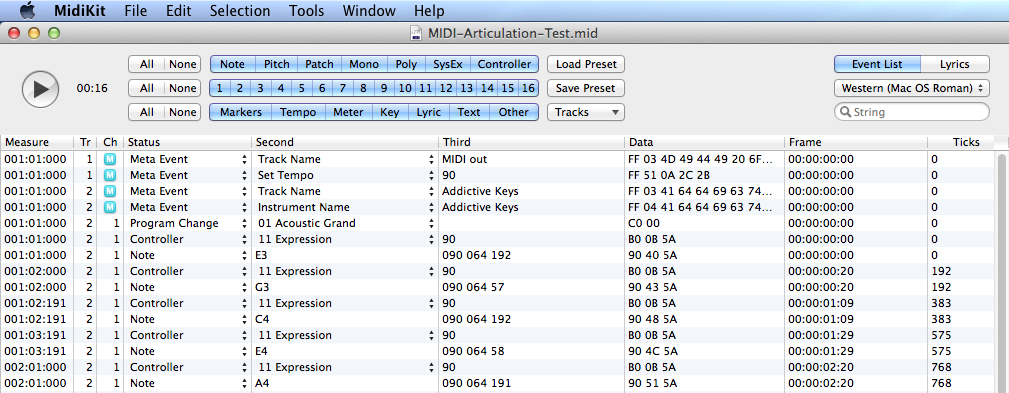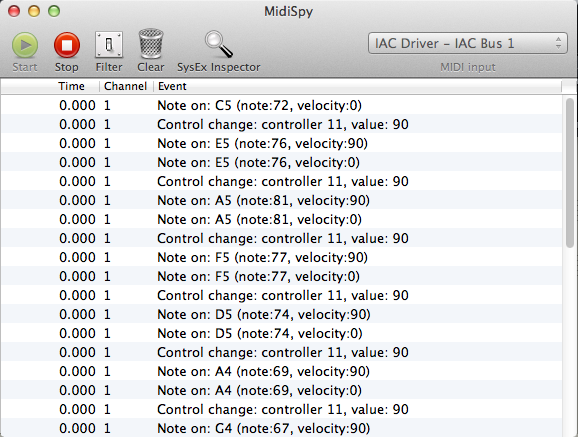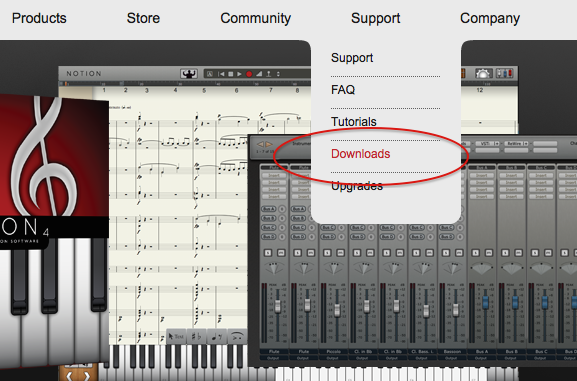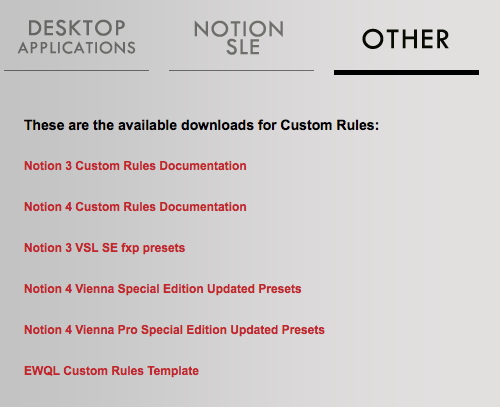luigi.di.guida wrote: I'm not completely agree with what you say ...
Let's start over . . . luigi.di.guida wrote:I currently use this setup:
Sibelius ---> IAC Drivers ----> Logic Pro X ----> Vienna Ensemble Pro
Sibelius plays through IAC Driver the Logic track, on which VEP instances are open.
Setting the sound set of VEP in Sibelius, all the articulations are sent to the IAC bus and then to Vienna through Logic.
In this way, all audio is handled by the mixer in Logic: Sibelius is just a "player", without VST instances open.
This can be done with NOTION 4 in a ReWire 2 session, where Logic Pro X is the ReWire 2 host controller and NOTION 4 is a ReWire 2 slave. If you start Logic Pro X first, then it is done in a ReWire 2 session, but if you start NOTION 4 first, it is not done in a ReWire 2 session. The advantage of doing it in a ReWire 2 session is that ReWire 2 coordinates the transports and keeps everything synchronized . . . The concern I have regards "all the
articulations are sent to the IAC bus" and the way "articulations" is defined . . .
The key bit of information is that a NOTION 4 External MIDI staff does
not know it is connected to VSL, MachFive 3, Reason 7.1, Addictive Drums, Logic Pro X native instruments, or anything else in a very specific way; so it follows generic rules rather than rules tailored to the specific sampled sound library and rendering engine . . .
[
NOTE: This is the set of articulations supported by generic rules: {dash, staccato, staccatissimo, mezz-staccato, accent, legato-accent, staccato-accent, staccatissimo-accent, strong-accent, legato-strong-accent, staccato-strong-accent, staccatissimo-string-accent, soft-start}, which is fine, except that other than a bit of information about velocity, this is all that is supported by generic rules. There are no keyswitches or anything else that refers to playing styles (a.k.a., "techniques") or anything else, so it is only a limited subset of everything that the Vienna Symphonic Library products provide . . . ]
In the same scenario, it appears from what you wrote that Sibelius somehow knows it is sending MIDI to play VSL/VEP, although perhaps not . . .
Regardless, it apparently works nicely in the scenario you described ("Sibelius ---> IAC Drivers ----> Logic Pro X ----> Vienna Ensemble Pro"), which is great!
luigi.di.guida wrote:It's possible to replace Sibelius with Notion 4 and getting the same result?
In other words, you can apply the template and the joints of VSL to an external MIDI port?
Notation 4 ---> External MidiPort ---> IAC DRIVER ----> Logic Pro ---> VEP?
This might be possible, but since I do not have VSL/VEP, other than the VSL Legacy samples that come with Kontakt 5, I have no way to do experiments to determine whether this is possible . . .
There is no predefined NOTION 4 template for doing this, but there might be a way to do it . . .
The key bit of information is that tailoring everything (articulations, dynamics, playing styles, and so forth) to a specific sampled sound library and rendering engine is done in NOTION 4 using a mapping which includes a set of rules; and there are a few predefined mappings that are provided with NOTION 4 and have more intimate interactions with NOTION 4 . . .
Specifically, there are four mappings for Vienna Symphonic Library products, as shown in the following screen capture . . .
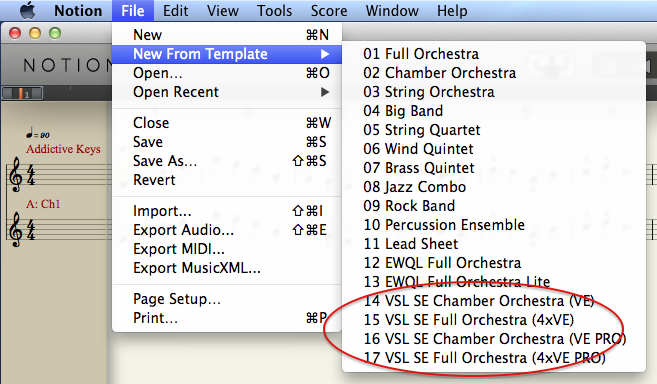
There is more information provided with NOTION 4, and one set of information is provided as "PluginData", which includes a specific set of tailored rules, which by convention are stored in rules files ("*.prules"), where the following images are partial screen captures provided to help get a sense of the types of information . . .
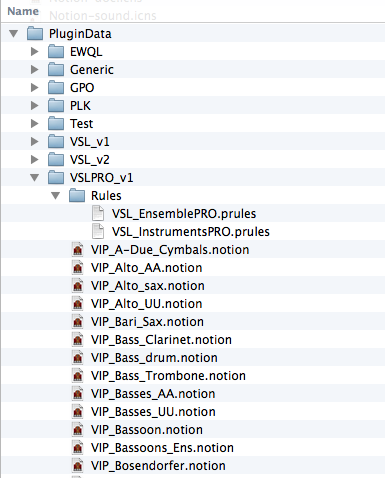
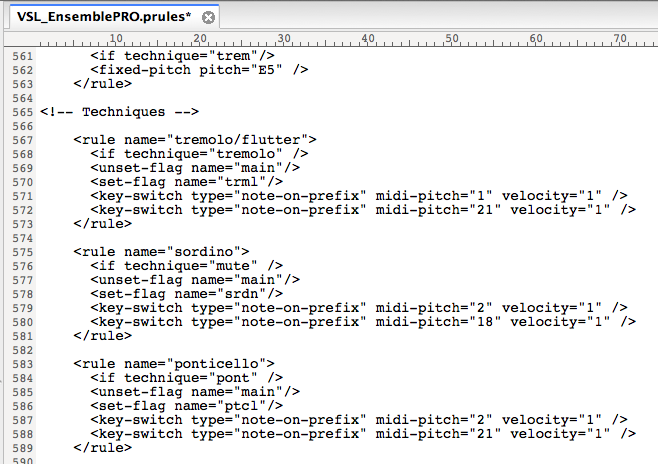
THOUGHTSI am not suggesting that one bicycle is better than another . . . Instead, I suggest (a) that there are different ways to ride bicycles and (b) that the best way to ride the NOTION 4 bicycle probably is different from the best way to ride the Sibelius bicycle . . .
If you want to have all the detailed mappings of articulations, dynamics, playing styles (a.k.a., "techniques"), and so forth tailored specifically to one of the four supported flavors of Vienna Symphonic Library products, then the recommended strategy is to use the respective predefined NOTION 4 template, which in turn maps to hosting the Vienna Symphonic Library product in NOTION 4 or connecting to it directly, as the case might be . . .
However, it is possible to create user-defined custom rules; and it might be possible to use a user-defined custom rules file with a NOTION 4 External MIDI staff, but at present all I can do is guess, since I have not experimented with this . . .
Nevertheless, I did some different experiments and verified that a NOTION 4 External MIDI staff recognizes and correctly transmits certain types of articulations, where one example is staccato . . .
If you do not need to be able to do all the elaborate activities, then NOTION 4 certainly can send MIDI to Logic Pro X based on music notation provided on a NOTION 4 External MIDI staff, and you have as many as 64 channels to do this, but with the caveat that certain types of MIDI information only is transmitted on Channel 1 of MIDI Port A, which is a bit of a problem, really . . .
When you are doing everything in 64-bit mode on a computer that has at least 16GB of system memory, then you can host Vienna Symphonic Library products in NOTION 4 and for the products NOTION 4 supports with special templates, rules, and so forth, you get the full range of articulations, dynamics, playing styles, and so forth . . .
So long as you have the audio buffers configured correctly and consistently for NOTION 4, Logic Pro X, and the various rendering engines, ReWire 2 will handle the synchronization, since this is one of the roles of ReWire 2 . . .
Depending upon one's perspective, people in Australia and England drive on the "wrong" side of the road, so if you need to drive in those countries, then you need to learn how to drive on the "wrong" side of the road. Of course, in the US, everyone tends to drive on the "right" side of the road, which as best as I have been able to determine is the reason that there are no "roundabouts" anywhere other than in Massachusetts, which we know is a state where there continue to be British loyalists, disturbing as it might be . . .
 Lots of FUN!
Lots of FUN! 
